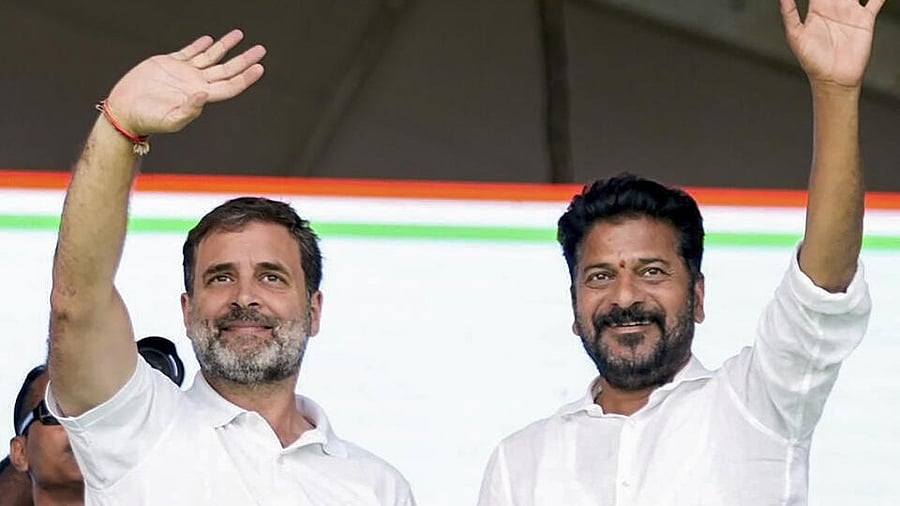
Rahul Gandhi and Revanth Reddy.
Credit: PTI Photo
In recent years, Congress leader Rahul Gandhi has emerged as a strong advocate for inclusion and diversity within India's political landscape. His consistent push for a caste census underscores the importance of equitable representation, particularly for marginalised communities such as the Schedule Castes, the Schedule Tribes, and the Other Backward Classes.
Gandhi has repeatedly raised concerns about the lack of representation for these communities at various levels of governance, including the secretary level and other influential domains. However, the situation in Congress-ruled Telangana presents a contrasting picture, especially when examining the composition of Revanth Reddy's Cabinet.
Among the 75 Congress MLAs in Telangana are 26 Reddys, 14 SCs, 9 STs, seven Backward Class, six Velamas, and one Kamma and Brahmin each. The Congress has a lone MLA representing the Mudiraj and Most Backward Classes (MBC) category. Overall, there are nine Madiga MLAs in the Telangana Legislative Assembly, with most of them belonging to the Congress.
Chief Minister Revanth Reddy has formed a 12-member Cabinet that includes seven upper caste members, including Reddy himself, two BC members, two SC members, and one from the ST community. This composition may seem diverse, but a closer examination reveals significant gaps in representation, particularly from certain numerically strong and politically significant communities.
Despite the substantial numerical strength of communities like the Mudiraj, Yadav, Munnur Kapu, Kuruma, and MBCs within the OBC category, none of these groups are represented in Reddy's Cabinet. Their absence is particularly striking given the Congress’ commitment to enhancing BC reservations and conducting a caste census.
The Cabinet also lacks representation from the Madiga community, a significant sub-group within the SCs, as well as from the Lambadas, who are a major group within the STs in Telangana. In the SC sub-categorisation issue, Madiga leaders openly expressed their concerns about representation in the Revanth Reddy Cabinet.
Rahul Gandhi's call for a caste census and his emphasis on equitable representation for the SCs, the STs, and the OBCs have resonated with many who seek a more inclusive governance structure. He has repeatedly questioned the underrepresentation of these communities at key levels of decision-making, including in the media and bureaucracy.
However, the reality in Telangana, as reflected in Reddy's cabinet, appears to diverge from this vision. Despite the Congress’ promises, the lack of representation for significant OBC sub-groups and certain SC and ST communities suggests a gap between the party's rhetoric and its actions on the ground.
The Bharatiya Janata Party (BJP) is focusing on a 4M strategy — Mudiraj, Madiga, Munnurkapu, and MBCs. By strategically managing caste composition, the party successfully increased its tally of MPs and vote share in the recent general elections. Additionally, the BJP is considering ways to counter the Congress’ rise in the Greater Hyderabad Municipal Corporation (GHMC) polls in 2025.
The Congress’ Kamareddy BC declaration assured that the caste survey would be undertaken immediately after the Assembly polls in 2023 and provide 42% reservations for the BCs in the local bodies. Many caste organisations are demanding the same.
The composition of Revanth Reddy's Cabinet raises serious questions about the inclusivity of Telangana’s governance. While Rahul Gandhi has been a vocal advocate for greater representation of marginalised communities, the situation in Telangana leaves a great deal to be desired.
For the Congress to truly embody inclusion and diversity, it will need to address the gaps in representation and ensure that all communities, particularly those that are numerically strong and politically significant, have a voice in the decision-making process.
G Kiran Kumar, National President, All India OBC Students Association (AIOBCSA).
Disclaimer: The views expressed above are the author's own. They do not necessarily reflect the views of DH.